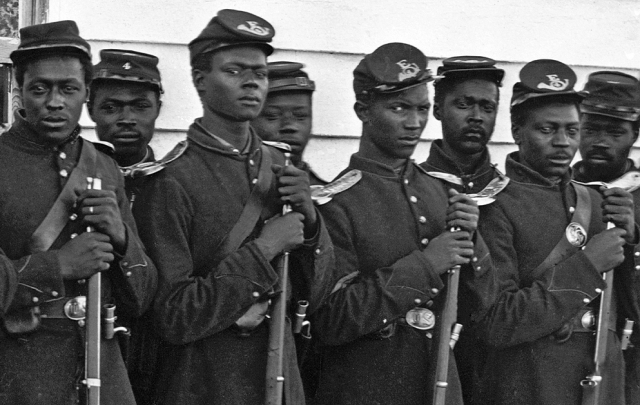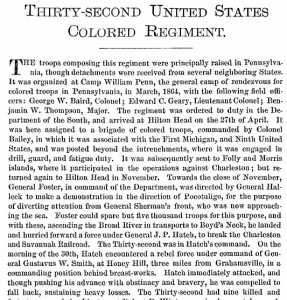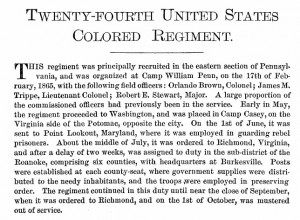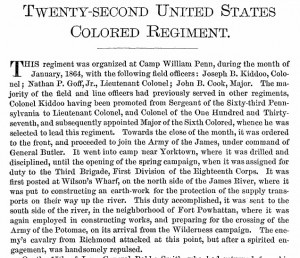 After African American soldiers were not allowed to participate in the Union army’s Grand Review in Washington DC in May 1865, Harrisburg residents organized their own event on November 14, 1865 for those who served in the United States Colored Troops. While this earlier post provides an overview, several other newspaper articles offer interesting accounts about the event. “No day could have been chosen more propitious for the occasion,” as the correspondent for the Philadelphia (PA) Inquirer observed that November 14 was “one of the finest of this most pleasant Indian summer.” After Simon Cameron delivered a speech, letters from those who could not attend were read aloud. General Benjamin F. Butler explained that he had “witnessed…[African American soldiers’] bravery and good conduct on the battle-field, and, above all, their devotion and unswerving loyalty to the flag and government.” Even “when their offers of service in the beginning of the way were rejected with contumely,” George L. Stearns noted that they still “promptly volunteered at the call of their country when she needed them to help conquer a relentless foe.” Others used the event to argue for equal rights. “All constitutional privileges, all laws, all ordinances, all regulations of States, discriminating against colored men, must be made null and void,” as Senator Henry Wilson proclaimed. The event ended with “the John Brown Song,” which as the Philadelphia (PA) Inquirer correspondent described, “the assemblage sang…with great zeal.” You can also read more about the ceremony in an excerpt from Ceremonies at the Reception of Welcome to the Colored Soldiers of Pennsylvania (1865)
After African American soldiers were not allowed to participate in the Union army’s Grand Review in Washington DC in May 1865, Harrisburg residents organized their own event on November 14, 1865 for those who served in the United States Colored Troops. While this earlier post provides an overview, several other newspaper articles offer interesting accounts about the event. “No day could have been chosen more propitious for the occasion,” as the correspondent for the Philadelphia (PA) Inquirer observed that November 14 was “one of the finest of this most pleasant Indian summer.” After Simon Cameron delivered a speech, letters from those who could not attend were read aloud. General Benjamin F. Butler explained that he had “witnessed…[African American soldiers’] bravery and good conduct on the battle-field, and, above all, their devotion and unswerving loyalty to the flag and government.” Even “when their offers of service in the beginning of the way were rejected with contumely,” George L. Stearns noted that they still “promptly volunteered at the call of their country when she needed them to help conquer a relentless foe.” Others used the event to argue for equal rights. “All constitutional privileges, all laws, all ordinances, all regulations of States, discriminating against colored men, must be made null and void,” as Senator Henry Wilson proclaimed. The event ended with “the John Brown Song,” which as the Philadelphia (PA) Inquirer correspondent described, “the assemblage sang…with great zeal.” You can also read more about the ceremony in an excerpt from Ceremonies at the Reception of Welcome to the Colored Soldiers of Pennsylvania (1865)
Serving Your Country
US Colored Troops
Over 180,000 black men fought for the Union army during the Civil War. Most of them served in the United States Colored Troops (USCT) which came into existence after the Emancipation Proclamation finally provided presidential endorsement for the much-discussed proposals for arming free blacks and former slaves in what had become the great conflict over slavery. This section provides information on how to learn about the evolution and experiences of the USCT in places such as Camp William Penn (pictured above), the great training ground in historic La Mott (Cheltenham, Pa) where more than 11,000 black soldiers mobilized for service.
100 Voices – 32nd & 37th USCT
32nd USCT
These men served in the 32nd United States Colored Troops Regiment –
Read more about this regiment here.
37th USCT
- Samuel Gardner served in the 27th United States Colored Troops Regiment.
100 Voices – 24th USCT
These men served in the 24th United States Colored Troops Regiment –
- Henry B. Carter
- William Clark
- John A. Fauset
- William Miller
- Abaraham Quamany
- William H. Rex
- Samuel Richardson
- John W. Simpson
- Lloyd W. Watts
Read more about this regiment here.
100 Voices – 22nd USCT
These men served in the 22nd United States Colored Troops Regiment –
- Clement Baker
- Emanuel T. Butler
- Benjamine A. Collins
- John W. Pinkney
- Joseph Rideout
- Enoch Watson
- Jacob Winters
Read more about this regiment here.
100 Voices – 8th USCT
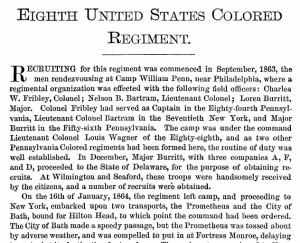
These men served in the 8th United States Colored Troops Regiment –
- Samuel Gibson (Company C)
- Gibbs Hoff (Company F)
- Rufus Sib Jones (Field & Staff)
- Prime Parrish (Company G)
- Elias Pennington (Company A)
- Melchia Thomas (Company E)
- Lloyd W. Watts (Company B)
Read more about this regiment here.
100 Voices – 3rd USCT

These men served in the 3rd United States Colored Troops Regiment –
- James Bostick
- Isaac Becket
- James Bostick
- Wilson Day
- Moses Dunsmore
- Jacob D. Enos
- Elisha McGuire
- Isaac Newton Phillips
- John Roberts
- John E. Smith
- James A. Spriggs
Read more about this regiment here.
100 Voices – 6th USCT
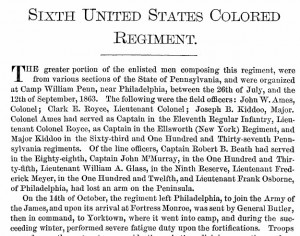 These men served in the 6th United States Colored Troops Regiment –
These men served in the 6th United States Colored Troops Regiment –
- Jeremiah W. Asher
- Levi Chaplin
- Thomas Dorsey
- John Harvey
- Alexander Kelly
- Lewis Mills
- Samuel Nadine
- Joseph Rutherford Phares
- Mordecai West
Read more about this regiment here.
100 Voices – 5th Massachusetts Cav, 54th & 55th Massachusetts
5th Massachusetts Colored Volunteer Cavalry
These men served in the 5th Massachusetts Colored Volunteer Cavalry –
- Aquila Amos
- James H. Bronson
- Lewis Bronson
54th Massachusetts
These men served in the 54th Massachusetts –
- George Brummzig
- Jacob Christy
- Albanus Fisher
- Wesley Krunkleton
- William W. Nesbit
- George T. Prosser
- James Shirk
- John Shirk
- Hezekiah Watson
55th Massachusetts
These men served in the 55th Massachusetts –
Harrisburg Grand Review: November 14, 1865
 On May 23 and 24, 1865, Union soldiers paraded through Washington D.C. for a grand review of the troops, a celebration from the grateful citizens to the Union soldiers for their efforts and service in winning the Civil War. Noticeably missing from the celebration were the over 180,000 United States Colored Troops who fought along side these troops being honored in the nation’s capital. While denied participation in the “Grand Review of the Armies,” black regiments from Pennsylvania and Massachusetts gathered in Harrisburg, Pennsylvania on November 14, 1865 for their own Grand Review. Thomas Morris Chester, a prominent Harrisburg resident and recruiter of black soldiers served as grand marshal of the Grand Review. The troops marched through the main streets of the Pennsylvania capital to the home of Senator Simon Cameron who delivered a speech honoring the black troops and commending them for their service and sacrifice to the Union. Cameron, an abolitionist and one of the early advocates for using black troops in the war, gratefully acknowledged the soldiers in the speech that was reprinted in the North American and United States Gazette in Philadelphia the following day.
On May 23 and 24, 1865, Union soldiers paraded through Washington D.C. for a grand review of the troops, a celebration from the grateful citizens to the Union soldiers for their efforts and service in winning the Civil War. Noticeably missing from the celebration were the over 180,000 United States Colored Troops who fought along side these troops being honored in the nation’s capital. While denied participation in the “Grand Review of the Armies,” black regiments from Pennsylvania and Massachusetts gathered in Harrisburg, Pennsylvania on November 14, 1865 for their own Grand Review. Thomas Morris Chester, a prominent Harrisburg resident and recruiter of black soldiers served as grand marshal of the Grand Review. The troops marched through the main streets of the Pennsylvania capital to the home of Senator Simon Cameron who delivered a speech honoring the black troops and commending them for their service and sacrifice to the Union. Cameron, an abolitionist and one of the early advocates for using black troops in the war, gratefully acknowledged the soldiers in the speech that was reprinted in the North American and United States Gazette in Philadelphia the following day.
“I cannot let this opportunity pass without thanking the African soldiers for the compliment they have paid me, but more than all to thank them for the great service which they have been to their country in the terrible rebellion. Like all other men, you have your destinies in your own hands, and if you continue to conduct yourselves hereafter as you have in the struggle, you will have all the rights you ask for, all the rights that belong to human beings.”
The report called the celebration a success throughout and estimated that nearly seven thousand blacks attended the Grand Review as well as a sizable white population who came to pay their respects to “those who escaped the perils of a contest in which they risked their lives in defense of the nation honor and support of the constitutional authorities.” One of the prominent black participants was Reverend John Walker Jackson who offered a prayer that served as “a beautiful acknowledgment of the services which the black man rendered in the struggle for American nationality, civilization and freedom. The orator of the event, William Howard Day, discussed the attitude of the colored man and “the prospect which lay before him for improvement, social elevation and the acquirement of political rights.” The Grand Review concluded with a grand ball where the soldiers and those honoring them convened one last time.

